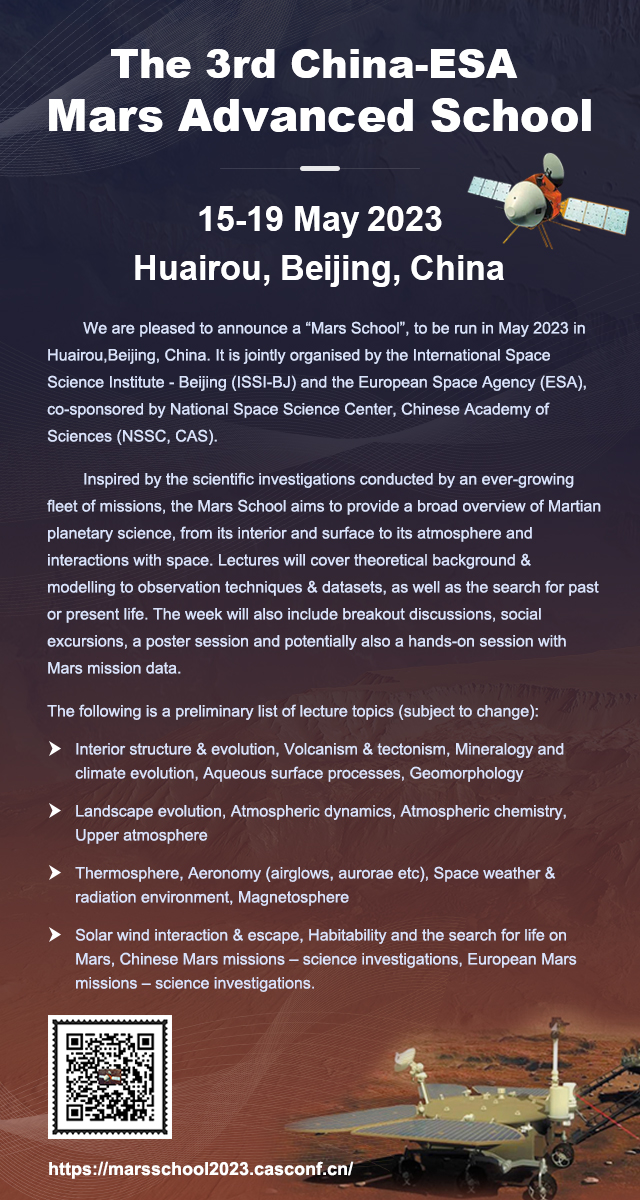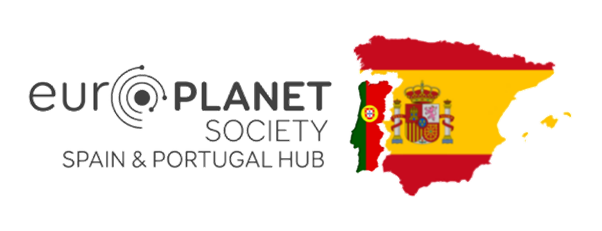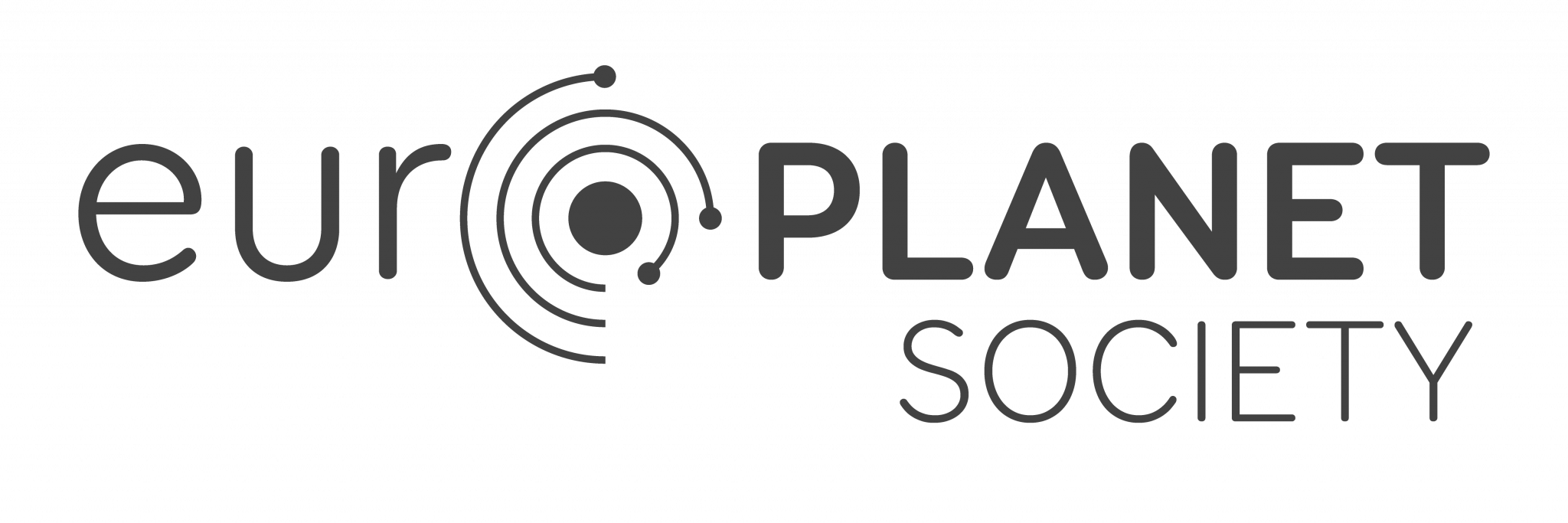Networking
Hub Activities
Space
Exploration
Join
Europlanet Society
Professional
Community
Facilities
Ground Based Telescopes
Amateur
Community
Members
Europlanet Society
Scientific
Conferences
Industry
& Stakeholders
Outreach
Activities
Dear colleagues,
 We are pleased to announce a China-ESA Mars School, to be run in May 2023 in Huairou, Beijing, China. It is jointly organised by the International Space Science Institute - Beijing (ISSI-BJ) and the European Space Agency (ESA), co-sponsored by National Space Science Center, Chinese Academy of Sciences(NSSC, CAS).
We are pleased to announce a China-ESA Mars School, to be run in May 2023 in Huairou, Beijing, China. It is jointly organised by the International Space Science Institute - Beijing (ISSI-BJ) and the European Space Agency (ESA), co-sponsored by National Space Science Center, Chinese Academy of Sciences(NSSC, CAS).
Inspired by the scientific investigations conducted by an ever-growing fleet of missions, the Mars School aims to provide a broad overview of Martian planetary science, from its interior and surface to its atmosphere and interactions with space. Lectures will cover theoretical background & modelling to observation techniques & datasets, as well as the search for past or present life. The week will also include breakout discussions, social excursions, a poster session and potentially also a hands-on session with Mars mission data.
The workshop will cover topics including:
- Interior structure & evolution, Volcanism & tectonism, Mineralogy and climate evolution, Aqueous surface processes, Geomorphology,
- landscape evolution, Atmospheric dynamics, Atmospheric chemistry, Upper atmosphere,
- thermosphere, Aeronomy (airglows, aurorae etc), Space weather & radiation environment, Ionosphere,
- solar wind interaction & escape, Habitability and the search for life on Mars,
- Chinese & European Mars missions.
Lecturers and participants will be drawn both from Chinese and European Mars science communities.
Organization of the conference had been on hold due to coronavirus pandemic, but the recent changes of travel policy in China means that we now feel confident in being able to proceed with the conference. Accordingly, we will be opening application within the next week, with a foreseen application deadline of 24th Feb 2023. This short deadline is in place to leave sufficient margin for selection of financial aid (see below) and subsequent visa support & travel booking.
ESA will provide full travel funding to enable participation by a small number (~12, tbc) of European early career scientists. Priority will be given to those who are no more than three years post-PhD. Applicants will be selected to achieve a balance of representation of ESA member states, of topical areas, and of gender – so we invite a broad range of applications.
All details about the programme, application, and financial support for European participants, will be announced via the conference website at http://marsschool2023.casconf.cn.
Colin Wilson (ESA) & Yang Liu (NSSC), co-chairs of the science committee.
The Instituto de Astrofísica e Ciências do Espaço en la Universidade de Coimbra has a possibility of a PhD position in planetary science , it has to go through the selection process of “La Caixa” doctoral INPhNIT process. It is associated with the SUPERIOR: SUrface PropERtIes Of tRans-neptunian objects using Webb project. It is lead by Dr. Nuno Peixinho (IA, Univ Coimbra, Portugal),and the graduate student would work with him, with Pedro Lacerda (IA, Univ Coimbra & IPN, Portugal), and with me, Noemi Pinilla-Alonso (UCF, USA) lead of DiSCo, a large program to study trans-Neptunian objects with the Webb.
Deadline, January 25th.
SUPERIOR
https://finder-fellowships.lacaixafoundation.org/finder?position=6037
http://iastro.pt/ia/jobDetails.html?ID=206
There are other 9 opportunities for those not into planetary science.
Tytle: Tackling Venus atmosphere from different approaches: theory-modelling, observations and space missions Reference of the FPI contract CEX2021-001131-S-20-1
Centre: Instituto de Astrofísica de Andalucía - CSIC
Type: Predoctoral
Description:
Venus is in the spotlight of the public and scientific community after the selection of 3 missions: DAVINCI and VERITAS by NASA and EnVision by ESA/NASA. It remains an open question how Venus and the Earth started so similarly but become such different worlds. Thus, studying Venus is essential for understanding the links between planetary evolution and the habitability of terrestrial planets, including those outside our Solar System. Several Earth-sized exoplanets have been recently detected in short-period orbits of a few Earth days around low-mass stars. Those planets have stellar irradiation levels several times that of the Earth, suggesting that a Venus-like climate is more likely than an Earth-like. Consequently, the atmosphere of our closest planet Venus represents a relevant case to address observational prospects of rocky close-in orbit exoplanets.
The successful candidate will be in particular involved in EnVision mission, notably, he/she will join the international consortium of the high-resolution spectrographs VenSpec-H and VenSpec- U. She/he will use a sophisticated 3D model for Venus that has been developed since 2010 at LMD/IPSL in France, in the frame of a collaboration between different European institutions, including IAA-CSIC, to analyze and identify potential physical, chemical, or dynamical processes driving the variability of trace gases above the cloud tops of Venus (70 km altitude, approximately). Heterogenous chemical processes will be implemented and studied, and the impact of complex cloud models and scenarios on the water and sulphur species will be interpreted. These model developments will also contribute to the Venus Climate database (VCD), an online platform containing the meteorological fields derived from the Venus 3D Model and provides the scientific community with a climatology for many characteristics of the Venusian atmosphere from the surface to the exosphere, in addition, a similar but simplified condensation cloud model will be implemented into a “Generic” 3D model, developed for exoplanets and paleoclimate studies, to simulate H2SO4-H2O clouds “interactively” in the atmosphere of Venus-analogues around both Sun-like and M-dwarf stars, with the primary goal of providing realistic predictions of future observations of cloudy rocky exoplanets foreseen by the Webb Space Telescope and new-generation instruments and facilities (e.g. ELT).
The PhD thesis advisors will be Gabriella Gilli and Luisa M. Lara





